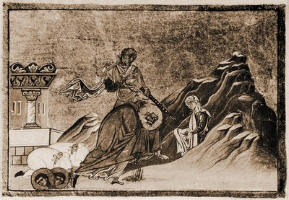
The Works Of Dionysius The Areopagite Volumes 1 & 2
SECTION XXXV
Now the Oracles call conscious transgressors those who are thoroughly weak as regards the ever memorable knowledge or the practice of the Good, and who, knowing the will, do not perform it,—those who are hearers indeed, but are weak concerning the faith, or the energy of the Good. And for some, it is against their will to understand to do good, by reason of the deviation or weakness of the will. And in short, the Evil (as we have often said) is want of strength and want of power, and defect, either of the knowledge, or the never to be forgotten knowledge, or of the faith, or of the aspiration, or of the energy of the Good. Yet, some one may say, the weakness is not punishable, but on the contrary is pardonable. Now, if the power were not granted, the statement might hold good; but, if power comes from the Good, Who giveth, according to the Oracles, the things suitable to all absolutely, the failure and deviation, and departure and declension of the possession from the Good of our own proper goods is not praiseworthy. But let these things suffice to have been sufficiently said according to our ability in our writings “Concerning just and Divine chastisement,” throughout which sacred treatise the infallibility of the Oracles has cast aside those sophistical statements as senseless words, speaking injustice and falsehood against Almighty God. But now, according to our ability, the Good has been sufficiently praised, as really lovable,—as beginning and end of all—as embracing things existing—as giving form to things not existing—as Cause of all good things—as guiltless of things evil—as Providence and Goodness complete—and soaring above things that are and things that are not—and turning to good things evil, and the privation of Itself—as by all desired, and loved, and esteemed, and whatever else, the true statement, as I deem, has demonstrated in the preceding.

 Keep Site Running
Keep Site Running